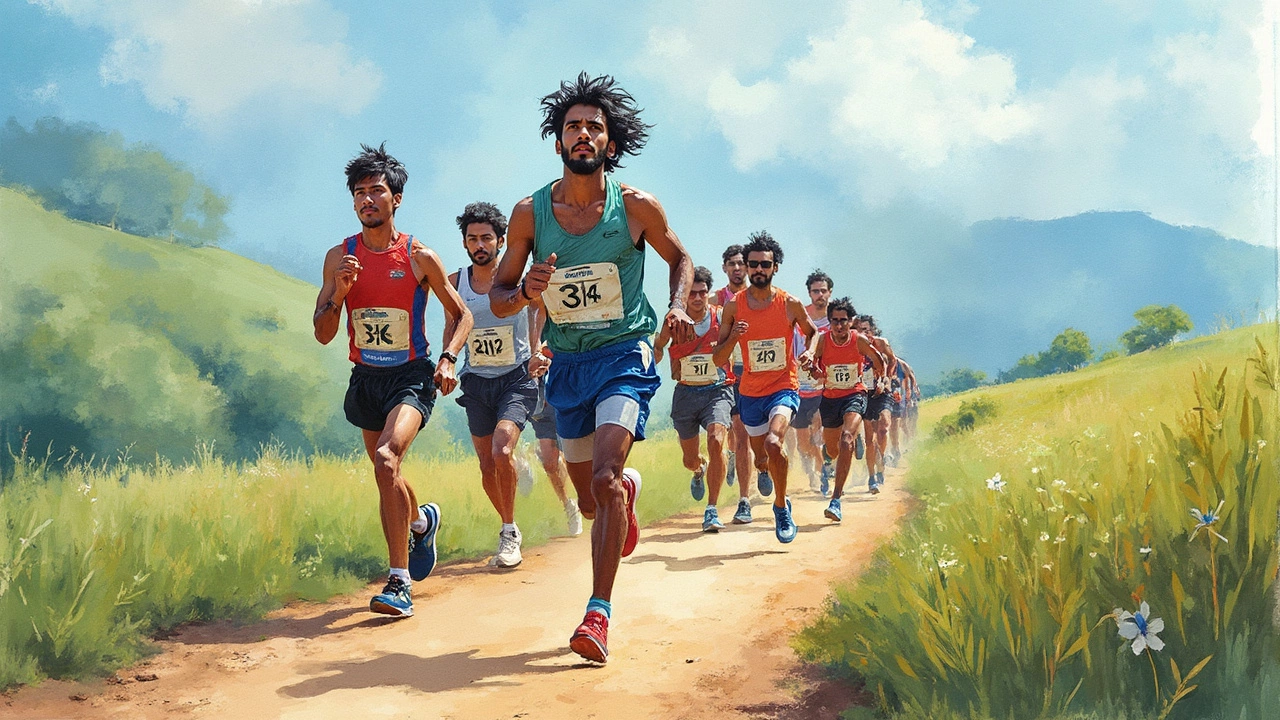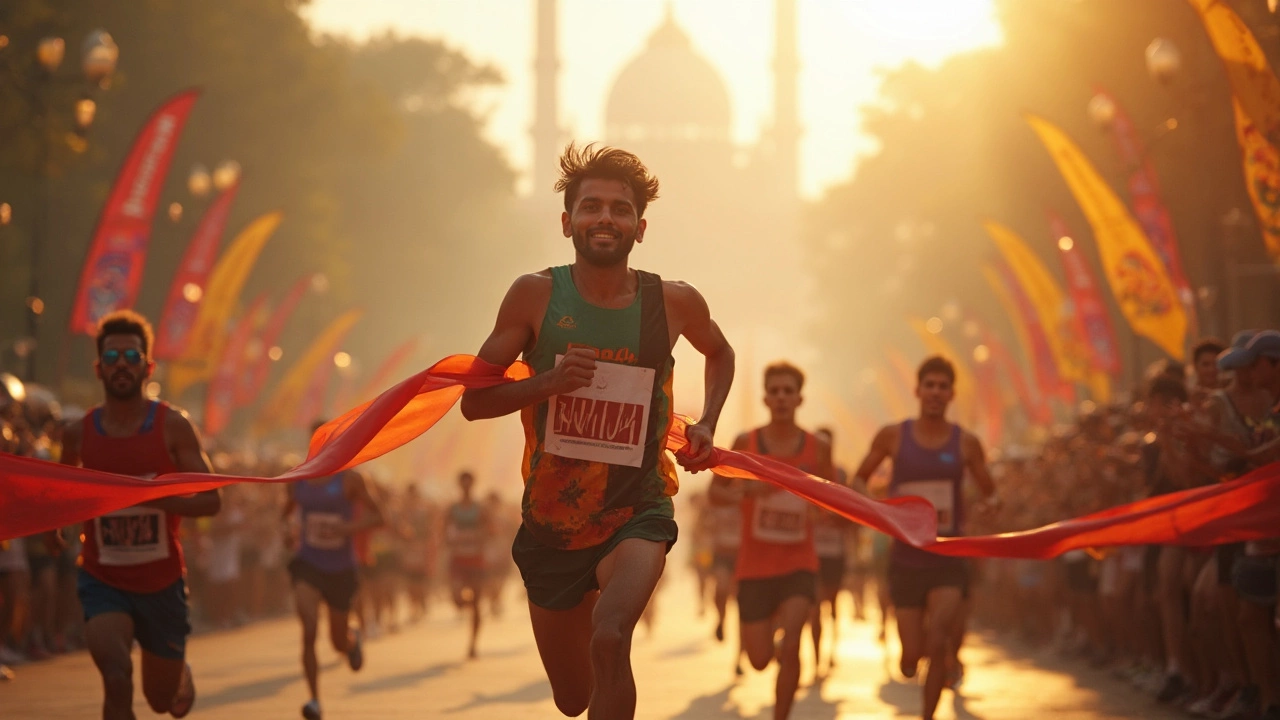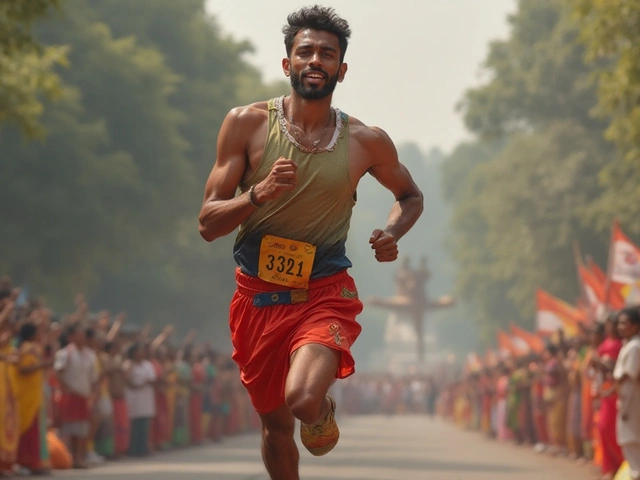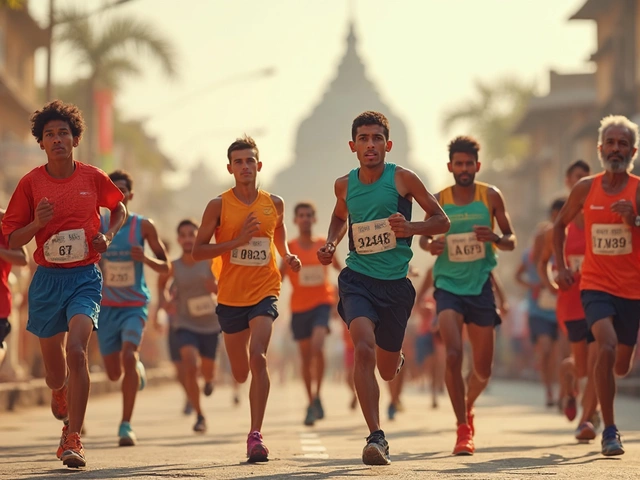If you're eyeing a marathon finish time of 3 hours and 20 minutes, you're not alone in wondering if it's a good goal to have. This is quite a popular target, especially for those who've been running for a while and are looking to break through to a more competitive level.
To put it in perspective, hitting 3:20 means averaging just over a 7:37 per mile pace—which, let's be honest, isn't a walk in the park for most of us. It's a pace that requires a well-thought-out training plan, dedication, and enough mental toughness to push through the inevitable tough moments on the course.
For many, reaching this time demands structured training with long runs, speed work, and perhaps some hill training. And don't forget nutrition and recovery; they play a massive role in keeping your body primed for race day while helping prevent injuries. But it’s not just about the physical; having a strong mental game often makes the biggest difference when you toe the line.
- Understanding Marathon Times
- Training for 3:20
- Nutrition and Recovery
- Mental Preparedness
- Race Day Strategy
- The Role of Experience
Understanding Marathon Times
For a lot of runners, marathon time is more than just a number; it's a badge of honor. But what exactly does a 3:20 marathon time represent in the grand scheme of running? Let’s break it down.
What is a Good Marathon Time?
To decide if 3:20 is a good marathon time, it helps to understand the range of times runners typically aim for. While the average marathon finisher in a big-city race usually clocks in around 4 to 4.5 hours, a 3:20 time places you well above average. In fact, in many races, this time could qualify you for a Boston Marathon entry in certain age brackets.
How Competitive is 3:20?
It's competitive enough to earn you some serious bragging rights, but not so intimidating that it feels unreachable with hard work and the right training plan. Most runners who shoot for this time are likely looking for a personal best or a new challenge after achieving easier time goals.
Factors Affecting Marathon Times
Several factors can impact your race training and eventual marathon performance, including:
- Training volume and intensity
- Fuel and fluid intake
- Weather conditions on race day
- Course difficulty – hills can make a big difference
- Your pacing strategy
Understanding these variables can help you prepare for race day uncertainties and adjust your strategy as needed.
The Role of Age and Gender
Age and gender play a role in expected marathon times as well. Typically, younger runners have faster times, though it's common to see older athletes who are seasoned racers maintaining or even improving their performance over the years due to experience and resilience.
| Age Group | Average Marathon Time |
|---|---|
| Males 20-40 | 3:35-3:45 |
| Females 20-40 | 4:05-4:15 |
As you can see, a 3:20 finish would make you faster than average even among younger age categories.
Now that you understand where a 3:20 time fits, we can look ahead to the kind of training and mindset needed to achieve it. Ready to lace up?
Training for 3:20
Aiming for a marathon time of 3 hours 20 minutes is no small feat. It definitely requires an organized and smart approach to training. So, what does it take to hit that pace consistently? Let’s break it down.
Build Up the Mileage
Building your weekly mileage is crucial. Most runners aiming for a 3:20 finish find themselves comfortable with weekly averages of 40-60 miles. Remember, it's not just about running for the sake of it. Quality matters!
Incorporate Speed Work
Your training plan should include speed work to boost your overall pace. Think of intervals like 800m or mile repeats at a pace faster than your marathon goal. It’s meant to push your limits and build that all-important pace endurance.
Long Runs are Key
Long runs should be your weekly events, not just to build endurance but also to practice your marathon pace. Try to incorporate marathon pace miles towards the end of your long runs. This way, your body gets used to running fast on tired legs.
Mix in Cross-Training
Don't just stick with running. Cross-training with activities like cycling or swimming helps build strength and reduces the risk of overuse injuries. Plus, it’s a nice break from the grind of running every day.
Importance of Rest and Recovery
Rest is not a dirty word. Scheduling rest days is important to allow your muscles to recover and grow stronger. Don't shy away from them thinking they're lost days.
Here's a simple sample week for a 3:20 marathon training plan:
| Day | Activity |
|---|---|
| Monday | Rest or cross-train |
| Tuesday | Speed work |
| Wednesday | Easy run |
| Thursday | Tempo run |
| Friday | Rest or cross-train |
| Saturday | Long run |
| Sunday | Recovery run |
The goal here is consistency. Pay attention to your body and adjust as you see fit. Stick with it, and you'll be well on your way to achieving that coveted 3 hours 20 marathon finish.
Nutrition and Recovery
Running a marathon faster than a lot of people can even drive starts with what you put into your body. It's not just about the pasta dinners before race day, although carb-loading is definitely important. You need a well balance that includes carbs, proteins, and healthy fats to fuel your intense training sessions. And, of course, staying hydrated is key. But when you’re pushing for a marathon time like 3 hours and 20 minutes, it's about fine-tuning this balance.
Daily Nutrition Tips
A healthy diet means filling your plate with plenty of colorful veggies and fruits, high-quality proteins like chicken and fish, and complex carbohydrates. Opt for whole grains over processed carbs. Throughout training, protein supports muscle repair, which is handy after tough runs. Here's a simple rule:
- 50% of your calories from carbs.
- 30% from healthy fats.
- 20% from proteins.
The Role of Recovery
After pounding the pavement, your muscles need time to heal, and that’s where recovery comes into play. It's not just about taking days off, though. Active recovery activities like yoga or cycling can help keep your muscles in check without over-straining them.
Post-Run Rituals
Post-race day, resist the urge to flop on the couch for days on end. Gentle stretching, adequate sleep, and eating recovery-friendly foods play a huge part in getting back on track quickly. Look at foods like bananas for their potassium content and drink plenty of water to stay ahead of dehydration.
Importance of Sleep
Never underestimate good old shut-eye. Aim for 7-9 hours of sleep nightly to help your body heal and grow stronger. It also plays a crucial part in hitting that magical running pace on race day.
In short, a combination of proper nutrition and smart recovery strategies will not only help you recover quicker after runs but also prepare your overall body to meet the demands of marathon training. Remember these tips, and you've covered an important base in your journey to break that 3:20 barrier!

Mental Preparedness
When it comes to marathon running, the body can't do what the mind isn't on board with. For many runners aiming for a 3:20 marathon time, building mental resilience is as crucial as physical training. So, how do you train your mind to stay sharp for those grueling hours on the road?
Visualization Techniques
Seeing yourself succeed is a powerful motivator. Spend a few minutes each day imagining race day. Picture yourself feeling strong, maintaining your marathon pace, and crossing that finish line under your target time. This helps set your brain up for success.
Mindfulness and Focus
Mindfulness can boost your concentration and help you stay in the present moment during races. Practicing staying focused during training runs, especially long ones, helps ensure you won't falter when distractions hit. Simple breathing exercises can make a huge difference.
Dealing with the Wall
Nearly every runner fears 'hitting the wall,' which can feel like your body has run out of fuel. Preparing your mind to push through or even tactically slow a bit to recover is vital. Positive self-talk and reminding yourself why you're aiming for this goal can be empowering.
Embracing Discomfort
Running a marathon isn't meant to be easy. Embrace the discomfort as part of the challenge. Logically, pain indicates effort, and knowing that can help you push through tough spots. Remember, physical pain usually subsides, but the pride of hitting a race training target stays.
| Marathon Wisdom | What it Means |
|---|---|
| The last mile is run with the heart. | When your body wants to quit, your mind keeps you going. |
| Pain is temporary. Pride is forever. | The discomfort of the race will pass, but your achievement is yours forever. |
Ultimately, getting to a 3:20 finish time isn't just about physical strength; it’s a mental marathon, too. Train your mind as diligently as you do your body, and you'll be well-prepared to conquer the race with a strong mindset and an unbeatable spirit.
Race Day Strategy
Race day can be as nerve-wracking as it is exhilarating. You’ve trained hard, and now it’s all about executing your strategy to hit that coveted 3 hours 20 minutes marathon time. Here’s how to make race day go as smoothly as possible.
Pacing Yourself
Sticking to your pace is crucial. Hitting your target of 3:20 requires a consistent pace of about 7:37 per mile. Resist the urge to start too fast because of adrenaline. Use a GPS watch to keep your pacing in check and maybe practice with a running app or watch that can give you pace alerts.
Nutrition and Hydration
Nailing your fueling strategy is another key element. You should have practiced this during long runs. Aim to consume 30-60 grams of carbohydrates per hour. Use gels, chews, or sports drinks that you've tested before. Hydration is just as important. Drink according to thirst but don't overdo it—find a balance.
Mind Games
A strong mental game can make or break your race. Use positive affirmations and mantras you've prepared. Break the race into manageable chunks, thinking just about reaching the next mile marker rather than the whole 26.2 miles.
Adapt and Adjust
Plans don’t always go as expected. Be prepared to adjust to unexpected challenges like weather or crowded paths. If you're feeling good towards the last miles, you might consider picking up your pace slightly.
Knowing the Course
Familiarize yourself with the course layout. Check out elevation maps and know where the hilly sections are. Consider running parts of the course if you live nearby, or watch videos to get a feel of the terrain and conditions.
Remember, every marathon is a learning experience, and it’s important to adapt those lessons for future races. Whatever happens, crossing that finish line is an achievement worth celebrating.
The Role of Experience
The longer you've been running, the more you start to understand the little things that can make a big difference on race day. From pacing strategies to knowing how your body reacts to different conditions, experience can be a game-changer in achieving a 3 hours 20 marathon time.
Let’s talk about some specific ways experience plays a part: consistency, adaptation, and intuition.
Consistency is Key
For those who have run several marathons, the importance of consistent training becomes clear. Each cycle of training builds upon the last, helping you gradually improve your endurance and speed. It's like slowly stacking bricks to build a solid wall.
Adapting to Change
Every marathon is different, and seasoned runners often become adept at adjusting their strategies based on weather, terrain, or even stomach issues. A veteran runner once said, "The key is to remain flexible because no race goes exactly as planned."
"Running a marathon is like living life. It’s unpredictable; just when you think you’ve got it figured out, it throws you a curveball." – Hal Higdon
Intuition on the Run
Developing a strong runner's intuition is another benefit of experience. Knowing when to push the pace and when to hold back can save your race. Many seasoned runners learn to trust their instincts about fueling, hydration, and energy levels as they accumulate miles.
In summary, experience brings a level of comfort and confidence to marathon day that's hard to quantify. Every completed race teaches you something new, subtly shaping your approach and enhancing your performance for the next one.





